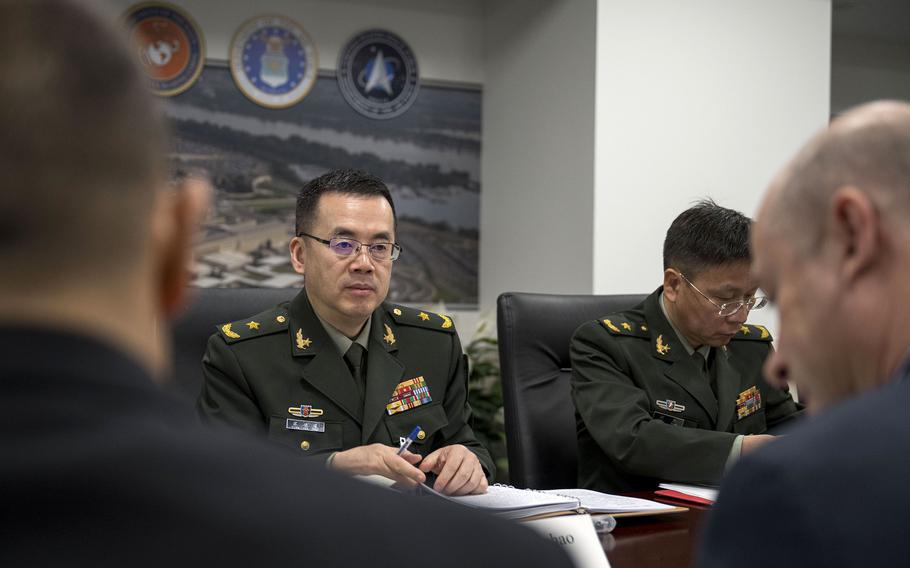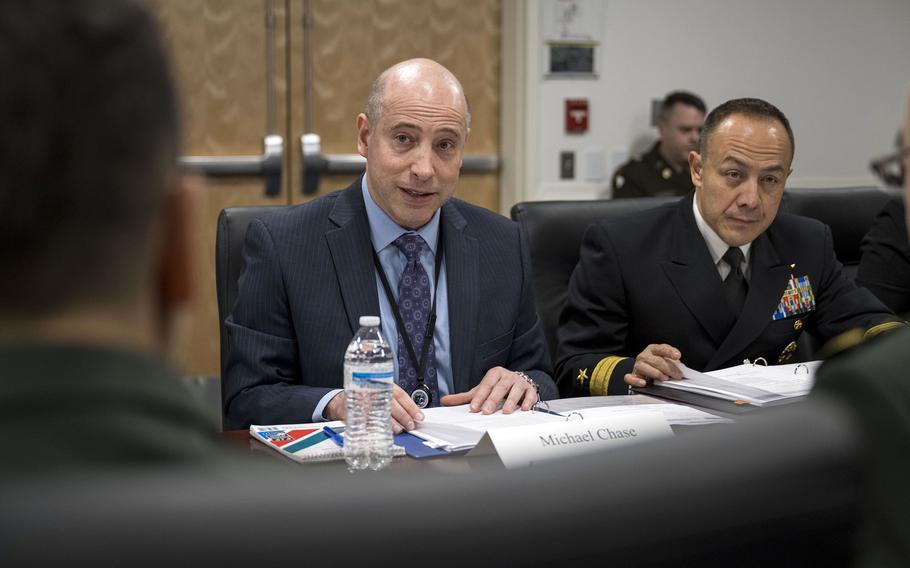
Chinese army Maj. Gen. Song Yanchao takes part in a military dialogue at the Pentagon in Arlington, Va., Jan. 9, 2024. (Alexander Kubitza/U.S. Navy)
Beijing will make no “concession or compromise” regarding Taiwan, Chinese military officials told their U.S. counterparts during the first face-to-face military dialogue between the two countries in four years.
U.S. and Chinese representatives met at the Pentagon on Monday and Tuesday to discuss military-to-military relations, global security and regional issues, according to readouts of the meeting released Wednesday by the Pentagon and China’s Defense Ministry.
The discussions — led by Michael Chase, deputy assistant secretary of defense for China, Taiwan and Mongolia, and Chinese army Maj. Gen. Song Yanchao — were the first between the two global powers’ militaries since 2021; direct talks were shelved after former House Speaker Nancy Pelosi visited Taiwan in August 2022.
President Joe Biden and Chinese President Xi Jinping met in November during the Asia-Pacific Economic Cooperation forum in San Francisco, where Xi agreed to resume the talks, the Pentagon said in its news release.

Deputy Assistant Secretary of Defense for China, Taiwan and Mongolia Michael Chase, center, hosts Chinese delegates at the Pentagon in Arlington, Va., Jan. 9, 2024. (Alexander Kubitza/U.S. Navy)
Chase “underscored the importance of maintaining operational safety” in the Indo-Pacific and reiterated the United States’ promise to “fly, sail and operate safely and responsibly wherever international law allows,” according to the Pentagon’s news release.
China urged the U.S. to “reduce military presence and provocative actions in the South China Sea,” Beijing’s defense ministry said in its news release. China will make no “concession or compromise on the Taiwan question and demanded the U.S. abide by the One China principle,” the release states.
Under the “One China” policy, the U.S. acknowledges Beijing’s view that it has sovereignty over Taiwan, which split from the mainland in 1949, but considers the island democracy’s status unsettled.
Beijing also called on the U.S. to “stop arming Taiwan, and not support Taiwan independence,” according to the release.
China considers Taiwan, a functionally independent democracy since 1996, as a breakaway province that must be reunified with the mainland, by force if necessary.
The military dialogue coincided with a visit from Taipei’s de facto ambassador to the U.S., Alexander Yui, Taiwan’s Foreign Ministry said in a new release Wednesday.
Yui met Tuesday with House Speaker Mike Johnson and said the two countries’ relationship is based on “such shared values as freedom and democracy,” according to the release. Yui also said he hopes to continue working with Congress.
China protested the meeting and called on the U.S. to break official ties with Taiwan, according to a transcript of Chinese Foreign Ministry spokesperson Mao Ning’s press conference on Wednesday.
“There is only one China in the world. Taiwan is an inalienable part of China. China firmly opposes the U.S. having any form of official contact with the Taiwan region,” she said.
The Biden administration is already planning to send an unofficial delegation to Taiwan following Taipei’s presidential election this weekend, The Associated Press reported Thursday, citing an unnamed senior administration official.
The official indicated that an in-person meeting is “the most effective way” to convey U.S. policy to the new Taiwanese government, the report said.
While the delegation would be made up of former senior officials and technically be an “unofficial visit,” the move could still drive a wedge between the tenuous relationship between Washington D.C. and Beijing.